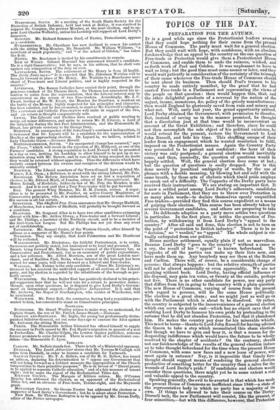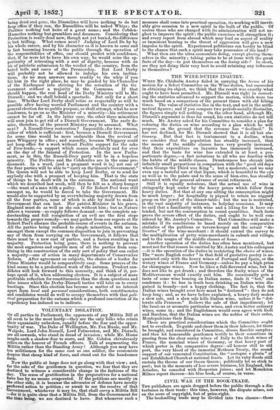TOPICS OF THE DAY.
PREPARATION FOR THE AUTUMN.
IT is a good while ago since the Protectionist leaders avowed that they could hope nothing for their cause from the present House of Commons. The party must wait for a general election. But they could wait with hope, with confidence, with an absolute foreknowledge that an appeal to the country on the one question of Free-trade or Protection would give them a Protectionist House of Commons, and enable them to undo the ruinous, wicked, and so-forth work of Peel and Cobden. It was unpleasant to have to wait so long; but the good time must come sooner or later, and they would wait patiently in consideration of the certainty of the triumph of their cause whenever the Free-trade House of Commons should be sent about its business. Then should Peel's treason to his country be made entirely manifest, by the proof that he had carried Free-trade in a Parliament not representing the views of the people on that question: then would happen this, that, and the other delightful products of a reversal by the nation of the unjust, insane, monstrous, &c. policy of the greedy manufacturers: then would England be gloriously saved from ruin and misery and what not. Well, early last year, the grand opportunity arrived. Lord Derby obtained the Government, with permission to dissolve. But, instead of saving us in the manner promised, he thought that a dissolution just at that time would be inconvenient on account of the Great Exhibition; and therefore since he could not then accomplish the sole object of his political existence, he would retreat for the present, restore the Government to Loicl John Russell, and bide his time. This shuffling escape of their leader from an engagement which he wanted resolution to fulfil, imposed on the Protectionist masses. Again the Country Party was persuaded to be patient and confident: the hour of their victory was only postponed; a general election would inevitably come, and then, assuredly., the question of questions would be happily, settled. Well, the general election does come at last ; but the question of questions is coolly dropped. Nor is this done merely by jesuitical ambiguity of words, by the use of phrases with a double meaning, by blowing hot and cold with the same breath, by those arts of rhetoric which timid pride employs to sneak out of a difficulty. The Coppocks of the Derby party have received their instructions. We are stating an important fact. It is now a settled point among Lord Derby's adherents, candidates for seats in Parliament, that they are to throw over Protection in so many- plain words—to declare themselves openly unqualified Free-traders—provided they find this course expedient as a means of gaining their election. This course has been already taken by several Government candidates, and others are preparing to take it. Its deliberate adoption as a party move settles two questions in particular. In the first place, it settles the question of Pro- tection, by withdrawing it from Lord Derby's "appeal to the country." After all said and done, this election is not to turn on the point of "protection to British industry." There is to be no "decision," no "verdict," no "appeal." The whole subject is vir- tually extirpated from our politics.
Hence another settlement, equally plain if not so marvellous. Because Lord Derby "goes to the country" without a cause or a cry, the result of his "appeal" is known beforehand. The Coppocks of all the parties can make up their lists now, and have made them up. Any busybody may see them at the Reform and Carlton. There will, of course, be a considerable change of persons; • that always happens : but the relative strength of parties will not be altered materially or even appreciably. We are not speaking without book. Lord Derby, having official influence at his disposal, may gain ten votes, or twenty at the outside, perhaps not five. There is no other candidate for power, nor any party that differs from his in going to the country with a plain question. The new House of Commons, varying of course from the present with regard to persons, will be the same House politically. The election is a great sham ; and we might just as well go on with the Parliament which is about to be dissolved. Or rather, the country is subjected to the inconveniences of a general election which can serve no public end—which has no object save that of enabling Lord Derby to humour his own pride by pretending in the autumn that he did not abandon Protection, but that it abandoned him. He makes the country pay dear for his miserable whistle. This must be borne—thanks to Lord John Russell for having advised the Queen to take a step which necessitated this sham election. But though we have to grin and bear it, is that a reason for the desponding indifference which would leave the future to be wholly resolved by the chapter of accidents ? On the contrary, should not our foreknowledge of the results of the general election induce us to take thought beforehand for the time when the present House of Commons, with some new faces and a new lease of power, will meet again in autumn ? Nay, is it impossible that timely fore- thought should suggest means of rendering the general election productive of something better for the country than a salve for the wounds of Lord Derby's pride ? If candidates and electors would consider these questions, there might yet be to some extent a real and valuable appeal to the country. Speaking generally, the evil to be averted is that which has made the present House of Commons so inefficient since 1846—a state of the representative body in which no party has a majority of its own. If things be allowed to take their course on the Derby- Disraeli tack, the new Parliament will consist, like the present, of four minorities,—but with this difference, however, that Protection
being dead and gone, the Disraelites will have nothing to do but keep office if they can, the Russellites will be naked Whigs ; the Peelites nothing but heirs of a great name ; and the Cobden- Humeites nothing but grumblers and dreamers. Considering that Protection is really dead now, though not yet buried, the difference is but trifling. What comes next? Judging of Lord De.by by his whole career, and by his character as it is known to some and is fast becoming known to the public through the operation of the responsibilities of office, one should predict with confidence, that, if he were let to have his own way, he would seize the op- portunity of retreating with a sort of dignity, because with an air of patriotic submission to the verdict of the country, from the hated toils and cares of the Premiership. But Lord Derby will probably not be allowed to indulge his own inclina- tions. As no man answers more readily to the whip if you hit him in the right place, he may be goaded by his Chancellor of the Exchequer into striving for the retention of the Go vernment without a majority in the Commons. If that should happen, the real head of the Derby Ministry will be Mr. Disraeli ; and we shall behold a spectacle. But only for a short time. Whether Lord Derby shall retire as respectably as will be possible after having worried Parliament and the country with a general election for no public purpose, or shall attempt, what he now condemns, to go on as the Minister of a minority—his retirement cannot be far off. In the latter case, the other three minorities will soon join to get rid of a Disraeli Government. The early de- mise, therefore, of the present Ministry may be assumed. What next ? A Russell-Grey restoration ? Impossible ; for two reasons, either of which is sufficient: first, because a Disraeli Government for some time would be more endurable than the revival of pure Whiggery in office ; and secondly, because Whiggery could not keep office for a week without Peelite support for the sake of Free-trade,—a support which ceases absolutely and for ever on the day of the funeral of Protection. In the new Parlia- ment, as in this, the Russell-Grey party will be in a hopeless minority. The Peelites and the Cobdenites are in the same pre- dicament. In a word, (and a pregnant word it is,) not one of the four parties will be able to " carry on the Queen's Government." The Queen will not be able to keep Lord Derby, or to send for anybody else with a prospect of keeping him. That is the state of things to be dealt with in the autumn. The national. want which we described last week, will then be felt as a sharp hunger —the want of a man with a policy. If Sir Robert Peel were still amongst us, he would be forced to take the Government. He would also be supported by an overwhelming majority drawn from all the four parties, none of which is able by itself to make a Goverment that can last. Her patriot. Minister in his grave, England must do as well as she can without him ; but as Nature abhors a vacuum—as supply follows demand—as the complete un- derstanding and full recognition of an evil are the first steps towards the proper remedy—we may gather from our regrets at Sir Robert Peel's absence the probable course of events in the autumn. All the parties being reduced to simple minorities, with no tie amongst them except the common disposition to join in preventing any of them from carrying on the Government, it follows that there must be a new east of parties, and a fusion resulting in a majority.. Protection being gone, there is nothing to prevent the most sagacious and capable men of all the parties from com- bining in the construction of the only sort of policy that can enlist a majority—one of action in many departments of Conservative Reform. After agreement on subjects, the choice of a leader for Prime Minister would be comparatively easy. Some process of the kind seems to be a predestined work of the autumn. Prudent can- didates will look forward to this necessity, and think of it, per- haps speak of it, when addressing electors. It is a subject of more profitable reflection for constituencies than the sham questions and false issues which the Derby-Disraeli tactics will take on to every hustings. Since this election has become a matter of no interest apart fit= local and personal considerations, both constituencies and candidates would do well to occupy themselves with that poli- tical preparation for the autumn which a profound conviction of its expediency has induced us to indicate.



























 Previous page
Previous page